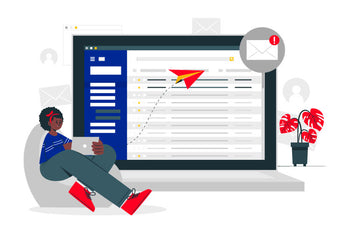Digital Marketing
Digital marketing often refers to any form of advertising that is distributed online or through digital media. In other words, digital marketing includes all of our consumer-reaching marketing initiatives conducted online. Email marketing, content marketing, affiliate marketing, social media marketing, and many more are excellent examples of digital marketing channels. Digital marketing enables entrepreneurs and businesses to promote their products, services, and brands by using these internet channels.
Let's look at some of the main advantages of digital marketing. Reaching the intended audience is both affordable and measurable. Only the clients who are most likely to buy your goods and services can be controlled and targeted.
Let explore some Major Benefits of Digital Marketing
- Reaching the intended audience is both affordable and measurable.
- Only the clients who are most likely to buy your goods and services can be controlled and targeted.
- Digital marketing can give you a comprehensive, end-to-end view of all the data, such as impressions, shares, views, and clicks, that may be important to your company.
- Observable and quantifiable outcomes. With the use of web analytics and other readily accessible online measuring tools, you can monitor the success of your campaign.
- Using Google Analytics, you can quickly monitor the traffic to your website and see who is visiting it in real-time.
- By communicating with people on social media, you can develop client loyalty and establish a reputation.
- You may connect with mobile users by using digital marketing, too.
Type of Digital Marketing

Search Engine Optimization (SEO)
SEO is the practice of enhancing and optimizing a website or web page to "rank" higher in search engine results pages by boosting the quality and quantity of organic traffic. Since SEO is a constantly evolving process, it is important to regularly check and improve our website for SEO. While performing SEO, we must concentrate on three things: SEO Onpage, Offpage, and Technical SEO.
OnPage SEO: On-site SEO is another name for on-page SEO. Here, we enhance and optimize our website in order to gain organic traffic and rank in search results. We regularly optimize URLs, H1 tags, internal links, title tags, content, and meta descriptions. We must make sure that our website is reliable and credible.
Off-Page SEO: When optimizing your website to rise in the search engine results, off-page SEO refers to everything that doesn't take place on your website itself. Building quality backlinks, your brand, and your appearance requires focus and work. Off-page SEO techniques include things like link building, guest posting, content marketing, social networking, and more. Off-the-page SEO refers to these activities that we carry out away from our websites. The quantity of websites linking to you and the perceived "authority" of those publishers both have an impact on how well you rank for the keywords that matter to you. In addition to increasing traffic to your website, you can collaborate with other publishers to write guest posts for their websites that link back to yours. This will draw other website visitors to your website.
In order to improve traffic to your website and help you move it up on the appropriate SERPs, you may network with other publishers and write a guest post for them on their websites (creating a backlink to your website in the process).
Technical SEO: Technical SEO includes anything that has an impact on how search engines index and crawl your website. In order to improve your rating, it is crucial to evaluate the website's coding and backend. In technical SEO, we must optimize your website's CSS file, image compression, structured data, and XML site map because these factors affect how quickly your website loads.
Social Media Marketing
One of the effective strategies for connecting with your customers and followers is social media. Due to the widespread usage of smartphones in modern society, it is also relatively simple. Social media marketing is essential for promoting your brand and content across a variety of social media platforms, including Facebook, Twitter, Instagram, Snapchat, Pinterest, and others. It builds social trust among your fans on social media. Additionally, sharing your content and products on social media can help your business attract more customers and generate leads.
Content Marketing
Reaching potential clients through the utilization of content from your website is the major goal of content marketing. Anything that is published on your website and marketed through email marketing, social media, SEO, or even PPC campaigns can be considered content if it relates to the goods and services your website offers. Your content needs to be valuable, pertinent, and consistent in order to attract organic traffic and generate leads for your organization. Blogs, articles, ebooks, infographics, and other content marketing tools assist people learn more about you and motivate customers who are looking for details about your goods and services.
Email marketing
One of the most common digital marketing techniques used by businesses nowadays is email marketing. Email marketing is the practice of notifying your website's "email subscribers" of any new activities using commercial email messages. Email marketing is a tried-and-true method for increasing sales and creating a brand community. You can email your subscribers with blog subscription newsletters, follow-up messages, holiday promotions, and discount offers, among other things.
You can read more about email marketing in our next blog.
Pay Per Click (PPC)
With the pay-per-click (PPC) advertising strategy, businesses can post their ads on advertising networks like Google, Bing, LinkedIn, Twitter, Pinterest, or Facebook, and when individuals click on those ads, marketers must pay a certain fee. PPC is very effective since it monitors people's online activity and is used to increase website traffic by showing the proper adverts. PPC ads can segment audiences based on factors like interest, gender, age, and even geographic location. These days, Google Ads and Facebook Ads are the most popular PPC platforms.
Affiliate Marketing

Affiliate marketing is the process of promoting the goods of other businesses on your website. You receive a specific commission when someone buys their product via your affiliate link. Many well-known corporations have affiliate programs that pay other websites, like Amazon, that advertise and sell their products millions of dollars each month. You will receive a commission on each sale made if you sell Amazon products on your website. You are essentially a salesperson for Amazon; the more you sell, the more commission you will earn.
Influencer marketing

Influencer marketing entails collaborating with public personalities such as celebrities, authorities, and specialists who already have a following on social media. They advertise your goods and services on social media sites like YouTube, Snapchat, and Instagram, and their fans will take them up on their suggestions and purchase your goods. Reaching a large audience is successful because, in general, celebrities have a large following.
Conclusion
There are numerous additional digital marketing channels, including radio and television broadcasts, video marketing, and many others. But in today's business world, the top 7 methods are those listed above. Avoid attempting to complete everything at once. Choose the most effective digital marketing strategy and concentrate on it to fulfill your goal. Always consider your customer while choosing marketing methods, and strive to understand how to increase customer engagement.


